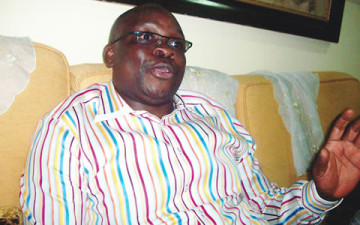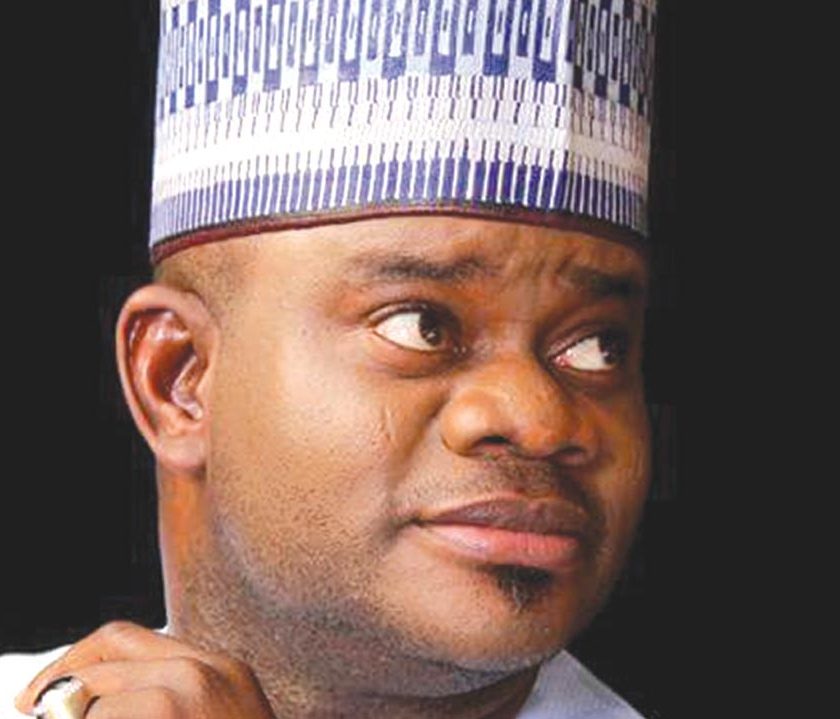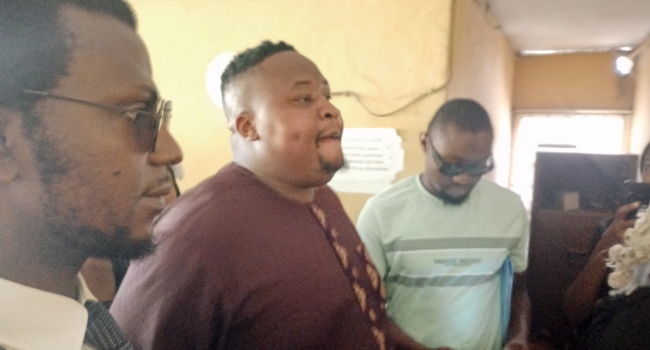The report of the committee submitted on September 18, 2005 to the Presidency reads: “Governor Fayose has zero-tolerance for opposition. He constantly sets in motion activities that will lead to violent acts and always travels out of town for his cohorts to perpetuate their violent acts without restraint and also create alibis.”
The report of the investigating team entitled, Update on Interim Report on Investigation of Alleged Threat to Life of Afe Babalola (Chief) by Ayo Fayose, Governor of Ekiti State, drew from sources it described as surveillance, record examination, elicitation and interviews. According to the report, investigation efforts began with the identification of Cottons Club, a recreational centre in Ibadan, Oyo State, which served as rendezvous for the suspected assassins.
The investigator also revealed that a source who frequents the fun-spot claimed that he overheard the suspected assassins perfecting plans on how to assassinate Babalola. Aside Cotton Club, the panel also discovered other spots allegedly used by the assassins as meeting points, where discussions were held in connection with their plans.
Part of the findings was that an Oodua People’s Congress (OPC) stalwart was a ready tool in the assassination attempt on Fasuba and the planned assassination of the former Aviation Minister, Babalola Borisade. The report confirmed the hired assassin was paid N250, 000 for the job. When he failed to carry out the assignment, his Isuzu Jeep was impounded by the governor. He was also present at the AD rally where the governor’s men clashed with that opposition party.
The panel came hard on him, both in character and bearing. Besides being described as hard-hearted and foolhardy, the report also dwelt on the Governor’s intolerance for opposition. It was also gathered that the Governor is most uncomfortable with the State Security Service (SSS) details posted to him because of the likelihood that such security operatives may not have good reports on him. Fayose’s love for intoxicants also attracted very generous attention from the investigators. “He is said to be a user of hard drugs, which makes him to be highly unpredictable and might have been responsible for some of his irrational acts.”
On his relationship with his erstwhile deputy, Abiodun Aluko, the panel revealed that their strained relations culminated in the assassination attempt on Aluko on 14 May, 2005 and the subsequent impeachment move by the Ekiti State House of Assembly. Part of the former Deputy Governor’s problems actually began with the N1.3 billion allegedly spent on the controversial Ekiti Poultry Project. According to the report, N800 million of the said amounts was frittered away by the Governor through drainpipes such as Biological Concepts Limited. Aluko, it was gathered, incurred the wrath of the Governor when he insisted on due process and accountability.
But the security report also linked Fayose’s propensity for violence to the many ugly incidents that punctuated his administration in the last three years. These were the assassination attempt on Taye Fasuba, Chairman, Ado-Ekiti Local Government; the state’s orchestrated protest led by Dayo Okondo and designed to recall an assertive member of the Ekiti State House of Assembly, an incident that resulted in the death of one Muyiwa Adeyanju, and the politically motivated attacks on Mobil Filling Station, Ikere Road, Ado-Ekiti.
Others include the illegal arrest and detention of law-abiding citizens like Joseph Adeleye Orisagbemi, the Atta of Aiyede, the unwarranted media attacks on Rufus A. Aladesanmi III, Ewi of Ado-Ekiti, the attempt on Okebiorun’s life over a political disagreement and the violence-ridden Federal Constituency bye-election at Omuo Ekiti in addition to the killing of Ekiti State College of Education students for protesting over the suspected removal of their provost. Above all, the Governor’s men allegedly operated a death squad.
The security report also confirmed how Fayose terminated the appointment of two editorial staff of Ekiti State Radio for ‘ungraciously’ reporting Governor Olagunsoye Oyinlola’s visit to the Ewi of Ado-Ekiti.
Aside the planned assassination of Babalola, the report also listed seven other names of people with complaints on threat to their lives: MB Ogele, a lawyer; Senator Bode Olowoporoku, A. Akilaya, O. Oni, Babafemi Ojudu, Femi Falana, Abiodun Aluko and Afe Babalola.
But the findings on the Governor’s aides are no less revealing. Chief Dayo Okondo, a retired army captain and former Chairman, Ikere Local Government Area, according to the report, maintains a terror machine that is dreaded throughout the State. In his statement, he claimed that the bloody clash at the Peoples Democratic Party (PDP) office in Ado Ekiti was mainly between the mainstream PDP and Lawrence Agunbiade’s faction.
He denied the allegation that the attack on Gbenga Jayeola, Sehinde Daramola and other students of the College of Education, Ikere took place in his house. He later told the panel that he did not fire a gun at the demonstrating students. Regarding the ward election and Democracy Walk which almost set Ado-Ekiti on fire, the retired army captain and Chairman, Ekiti State Civil Service Commission, said there was no time he called on the Governor to report the situation in Ifaki. He also denied knowledge of the death of Omojola and the attempt on Fasuba’s life.
However, the investigating team’s verdict on Okondo showed that the man “exhibits coercive tendencies and a pathological instinct for extreme violence which could have resulted from his military background in combat operations which was his specialization.” The report also referred to Okondo’s role in the death of seven people who lost their lives in 2000 at the PDP secretariat, Ureje, Ado-Ekiti during the party’s leadership crisis.
The case of Olugbenga Jaiyeola, a petty contractor in Ekiti who was found in a bus belonging to the Students Union Government of the Ekiti State College of Education during the riots, is pathetic. He was shot in the thigh by Okondo. In spite of the recommendation of the Judicial Commission of Inquiry and the subsequent white paper that his medical bills and the cost of N250, 000 and N1 million compensation be paid to him, the Fayose government has refused to implement both.
His sustenance, medical bills and cost of the artificial limb were, however, defrayed by Abiodun Aluko, former Deputy Governor. Okondo’s role in the fracas of 28 May 2005 during the inauguration of Ado-Ekiti Local Government Alliance for Democracy (AD) executive officials also attracted the panel’s attention. According to the report, Okondo, Goke Olatunji and the Fayose physically took part in the violence that took place at the Matthew Street venue of the AD inauguration. The concluding part of the verdict revealed, “that Okondo used prohibited firearms and ammunition and could have been in possession of such.”
Okondo is also alleged to be in charge of an illegal training ground somewhere at Igbemo in Ifelodun/Irepodun LGA of Ekiti (Fayose’s local government) where thugs “are trained in armed combat, weapon handling and so on.” Isaac Owolabi Fayose, the Governor’s younger brother, gave useful information on himself and his activities. He claimed to have returned to Ado-Ekiti from England, his former place of abode, to assist his brother in his political campaign in February 2003.
Later, he abandoned one of his businesses, Valentino’s Buddy Nite Club in Ado-Ekiti, following the row between the Governor and members of his family. Though he participated in his brother’s political activities in 2003, the younger Fayose told the panel that he is apolitical, having stayed out of politics all his life until 2003. He also denied knowledge of the Ifaki incident, claiming that he is just a simple businessman who provides security dogs to clients like Nigerian Ports Authority (NPA).
But the investigators insisted on further probing the questionable circumstances under which Isaac Fayose returned to Nigeria from the United Kingdom. They confirmed his use of hard drugs like Indian hemp and other psychotropical substances. The panel also faulted the younger Fayose’s claim that he received £100,000 as claims from a car accident in the U.K. The panel said he was actually present and took part in the beating of Omojola at Ifaki. They confirmed his presence at the Democracy Day Walk on Mathew Street and wondered why a man whose hometown is less than fifteen kilometres from Ifaki would claim that he had never been there.
Adegoke Olatunji, Personal Assistant, P.A. to Fayose, is about the closest aide to the Governor. Since 2000 when he was introduced to Fayose by Demola Ojo, Chairman, Ibarapa Central Local Government Area in Oyo State, the relationship has grown remarkably. Yet, despite their closeness, Olatunji still denied knowledge or participation in the many crises involving his boss. However, the security panel did not only describe him as a confidant of the Governor, but also referred to him as an active member of his kitchen cabinet.
In character, Olatunji is known to be temperamental, a trait that is further re-inforced by his suspected use of hard drugs. They also confirmed that he was not only aware of all the alleged violent acts involving the Governor but also collaborated. Olatunji was described as incompetent and lousy. According to the panel, he normally uses the Chief Security Officer (CSO) and some policemen under his command to foment trouble. They were in the habit of indiscriminately using firearms around the Government House, Ado Ekiti and Orole Hotel in Ikere. They routinely shot into the air without any need, to create panic and fear around members of the public.
Despite the P.A’s denial, his participation in the Ifaki bye-election crisis that resulted in the death of Omojola is fully documented in the Ekiti State Police Command letter ref. No LBO 900/EKS/SHQ/VOL.IV/86 of 19 March 2004. With the CSO, he arrested Joke Ogunleye and her two daughters. Olatunji, who operates a foreign account, an action that is contrary to the nation’s constitutional provisions, also has a landed property in the U.K.
He was found to be a collaborator in the Ifaki bye-election, where he was “alleged to have participated in the assault on Omojola, which culminated in his death, the clash with AD during the Democracy Day Walk, manhandling of the proprietor of Friendlies Hotel.” Like the Governor’s P.A, Timothy Gbenga Joseph, Assistant Superintendent of Police, ASP, Chief Security Officer, CSO to the Governor, is believed to have participated actively in all the alleged violent acts of Governor Fayose. Though he denied all the allegations and even lied under oath, security reports on him showed that he was appointed CSO under very controversial circumstances in the State, despite protest by the Ekiti State Police Command.
The panel also gathered that he boasted publicly about his exploits and admiration for certain controversial operatives. “The CSO has been boasting that Hamza Mustapha was his mentor. In a bid to live up to the position of CSO, and be like his mentor, he has involved himself in unprofessional conduct and extra-judicial activities by collaborating with Olatunji (P.A.) to arrest, torture, harass and detain citizens of Ekiti State without recourse to laid-down principles of criminal justice administration.”
He was linked to the arrest and detention of Joke Ogunleye and two of her children because of her husband’s perceived misdemeanour.” Joseph was also, according to the panel, responsible for the detention of Moses Olusola, Emmanuel Nidu, Sunday Ninu, Festus Akinola and Ogunmuti Ojo. Joseph was said to indulge in indiscriminate use of arms and ammunition without any just cause “by shooting into the air, to intimidate and threaten citizens in Ekiti State.
Fayose’s CSO, according to the panel, lied on oath in all his presentations. He was also found to be responsible for the arrest, torture and detention of Gabriel Ojo, Ayodele Olowoye and Oludare Oluseyi “for allegedly defacing the billboards of Fayose before the visit of President Obasanjo to Ekiti State in 2005.” He was also said to be responsible for laying siege through the use of police operatives to the official residence of the Deputy Governor by “restricting the movement of members of his nuclear family and relations.” That is, the Deputy Governor’s first daughter and the elder sister were prevented from having access to his official residence even when he was at home.
The panel, therefore, recommended that full investigation be carried out on his role in the plots to assassinate Chief Babalola and Falana. Worse still, Joseph was recommended for immediate redeployment. The panel, after its investigations, recommended that Goke Olatunji who “featured prominently in planning and execution of virtually all violent acts perpetrated…” be subjected to criminal prosecution immediately to avert his escape. Also, the Code of Conduct Bureau Tribunal, according to the panel, should look into Olatunji’s foreign accounts and landed properties within and outside the country. The panel said witnesses would testify against him on Omojola’s death. The Governor’s younger brother, in the submission of the panel, should be “prosecuted with others.” Moreover, the panel recommended further investigation into his finances both at home and abroad.
The panel came down heavily on Okondo, “the arrowhead of all violent acts against perceived opponents within and outside the PDP since year 2000.” These include the killing of the five party members at Ureje, Ado-Ekiti; the death of Muyiwa Adeyanju at the party’s secretariat in Ikere Ekiti in 2004; the shooting of Gboyega Jaiyeola in the town; Omojola’s death as well as the murder attempt on Fasuba and others. He was alleged to be implicated in the possession of illegal arms and ammunition, and the training of thugs at Igbemo in Ifelodun/Irepodun Local Government area.
The security panel, therefore, recommended him for “criminal prosecution” and that he should be further investigated. Also recommended by the panel for criminal prosecution is Timothy Gbenga Joseph who, because of his prolonged stay in government houses in Abuja and Ekiti, “has indulged himself in extra-judicial approach to solving and management of security problems.”
Apart from his role in the planned assassination of Babalola and Falana, illegal arrest and detention of Festus Akinola, Moses Olusola, Joke Ogunleye and others, the team advised that “Joseph’s activities should be further investigated.” For his role as the liaison in the alleged covert activities of Governor Fayose in Akure and Ibadan, the plan to murder Chief Babalola and other allegations, Babatunde Adesanya was recommended for criminal prosecution for conspiracy and attempted murder.
The team recommended the following people for further investigation: Moses Usman (a former orderly to Okondo), who allegedly fired gunshots at students of College of Education, Ikere-Ekiti; Mobile Police Sergeant Shaba Usman (force number 164870), the orderly to the Governor’s wife; Thaddeus Aina, Chairman, Ido/Osi Local Government Area on Ifaki killing; Akin Olayisade (on the incident); Kayode Osho, Commissioner for Works and one-time Chief of Staff to the Governor (over the attempt on Chief Babalola’s life) and Dele Owoju, Osho’s associate. Others are Ajayi Egbo, Okondo’s driver who allegedly conveyed the assailants to Fasuba’s house; Olomofe, Osho’s pal; one Mr. Brown, Fayose’s uncle, and others.
From The Archives: Exerpts of the Security Report That Nailed Fayose





